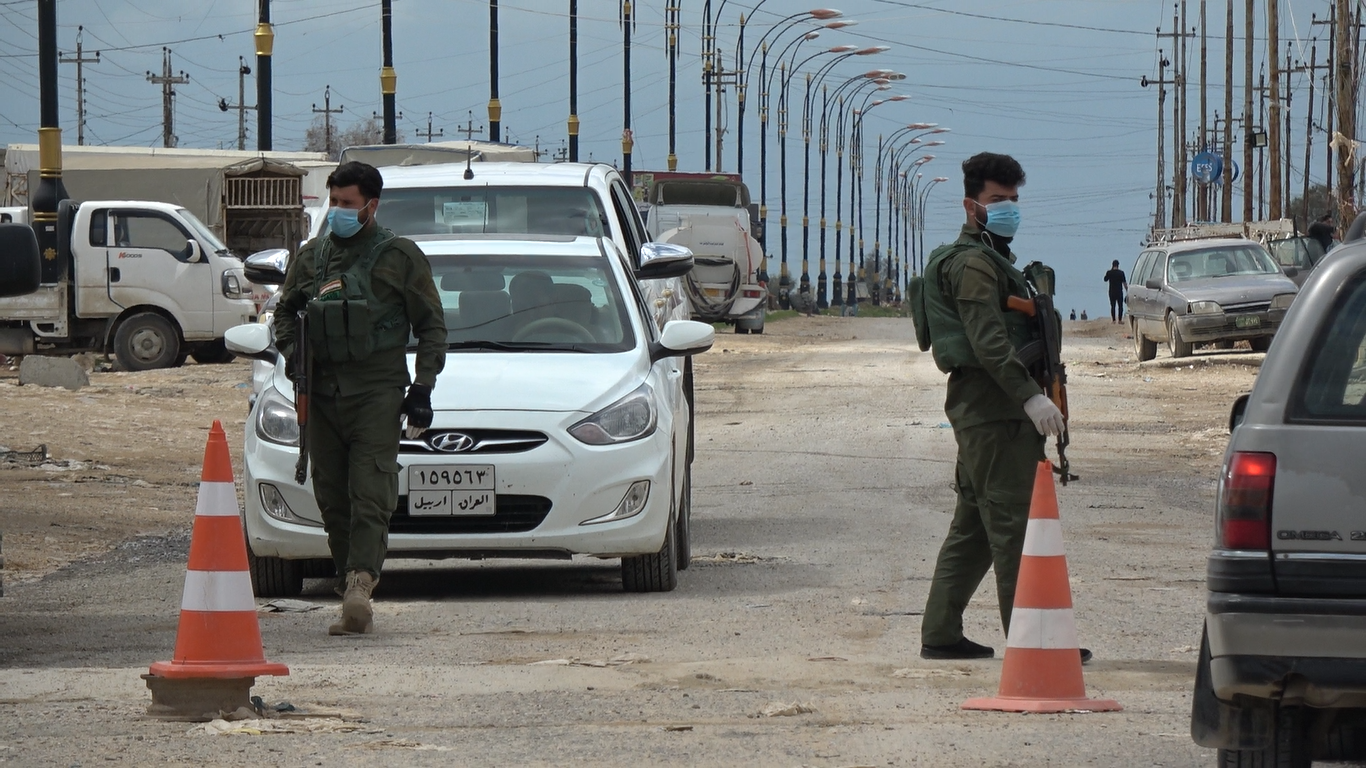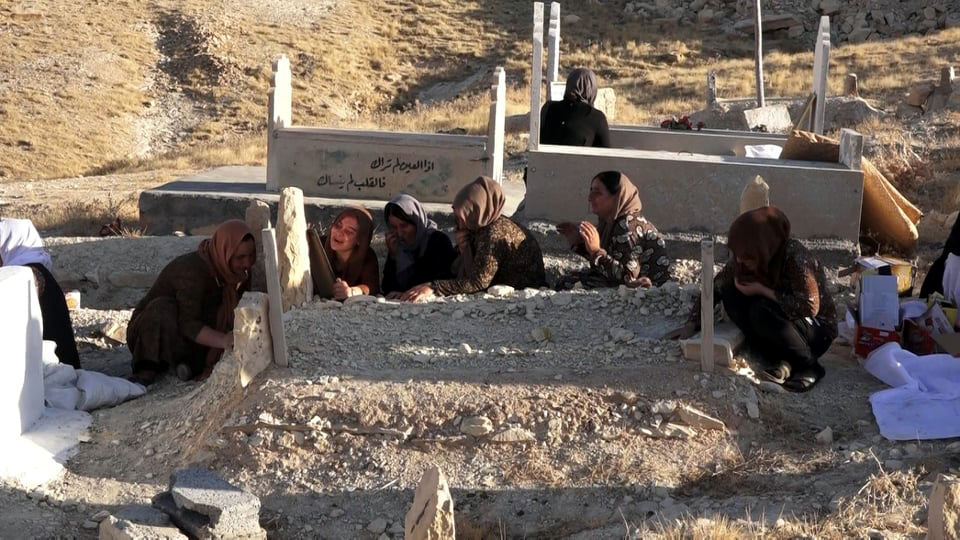Just like every other morning, Bayan woke up and appeared healthy, she joined her family for breakfast. Claiming that she needed to change her clothes, she then went to her room and closed the door.
While Bayan was changing, her siblings and father ate breakfast and then went to work. No one thought anything was unusual until one of her siblings opened the door of Bayan’s room.
“She hung herself in the room,” Nzar Mirza said, his eyes welling up with tears for his sister.

Bayan Mirza, 18, who hung herself, according to her family.
The death of this young woman was the third case of suicide by hanging in just the past three weeks recorded in Shingal district’s Ezidi community.
The incident happened on June 7 ,2020 in Wardi village, Gr’ozir sub-district, Sinjar, Nineveh.
“That morning, we had a pleasant breakfast and went to work while Bayan and my other sisters remained at home. It was such a miserable day. I have never felt such sorrow,” Nzar told KirkukNow.
Bayan Mirza (18) was an Ezidi girl and an 11th grade student. She attended school for only half of the academic year of 2019-2020 and was homebound after the outbreak of coronavirus and the nationwide imposition of travel restrictions.
The Iraqi government announced a nationwide lockdown in March to contain the spread of coronavirus, which has confined people to their homes.
We do not know why she killed herself
Amir Khudida, one of Bayan’s uncles, told KirkukNow, “we do not know why she killed herself. She loved life and reading. Surely she did not have any problems.”
Meanwhile, Jalal Khalaf, Commissioner of Gr’ozir, sub-district, claimed, “the preliminary investigations show that Bayan hung herself, although the medical examinations and the police reports have yet to be finalized.”
The national lockdown implemented as a response to coronavirus has led to a spike in domestic violence, which disproportionately affects women.
Navin Smuqi, an Ezidi activist explains the reason for the suicide cases
In its latest report on domestic violence during the coronavirus pandemic, the United Nations Population Fund (UNFPA) warns of an “increase in gender-based violence across Iraq with no possibility of sheltering all the women who are being abused due to the absence of a law that protects survivors.”
According to the organization’s report, “94% of the reported incidents [of gender-based violence] during the current pandemic are related to domestic violence,” adding that forty per cent of the women reporting domestic violence sought help and that there were more than 123 suicide attempts due to gender-based violence in just the past two months.
On May 19, 2020, Salwa Salo Mcho (24) “took her life” in Snune sub-district in Sinjar, leaving behind a daughter.
“My sister had issues with her husband. She came back to our house several times and then went back to her husband after they smoothed things over. But their problems continued and because of that, she hung herself.” Azizi Slo, Salwa’s brother, told KirkukNow.
But their problems continued and because of that, she hung herself
Unemployment, confinement, and the anxiety caused by coronavirus are believed to be the primary reasons for the surge in the domestic violence, particularly incidents resulting in suicide attempts.
Basna Misho (20), an Ezidi from Sinjar, is a resident of the Sharya camp for Internally Displaced Persons (IDPs) in Duhok where she runs a clothing shop for women. As a result of the lockdown and restrictions put in place over the past several months to contain coronavirus, she has lost business.
“If this situation continues, I will also shut down my shop. Let this problem also be added to the other thousands of problems,” she said.
Basna does not condone suicide or the abandonment of hope, “but unfortunately, there are women who cannot endure the misery and a significant number of problems [at home]. That is why they turn to suicide, which is also not a solution.”
There are women who cannot endure the misery and a significant number of problems
Basna strongly criticized the government and the authorities because they have not addressed citizens’, particularly IDPs’, concerns as they deal with the hardships of the government response to coronavirus. “We have lived [in the Sharya IDP camp] for five years, yet there has been no serious effort made to return the IDPs to their homes.”

Sinjar, a mobile checkpoint meant to enforce a curfew aimed at containing the spread of the virus, 2020. Photo: Ibrahim Ezidi
The majority of the Ezidis of Sinjar district and Nineveh province still live in displacement and have not been able to return to their homes. Ezidis comprise 30 per cent out of the 787,000 IDPs who have migrated to the Kurdistan Region of Iraq, according to statistics of the Joint Crisis Coordination center (JCC) of the Kurdistan Regional Government.
Farida Sa’do, head of Ezidi Women Endowment Organization in Sinjar, believes that the phenomenon of suicide among womenis not particular to Sinjar, “but the situation of the Ezidi women is different,” she claims, implying the violence the Ezidi women faced previously at the hands of the Islamic State group (IS) may be a factor.
The situation of the Ezidi women is different
Sa’ado discussed various activities her organization has arranged for Ezidi women and the assistance it has offered to them, adding that the group has other plans to launch an awareness-raising campaign.
Official statistics on suicide rates in Sinjar are unavailable but unofficial data obtained by KirkukNow shows that there were 20 cases of suicide in the district in 2019.
The suicide cases include not just women, but several Ezidi men and boys have taken their own lives as well.
On May 20, 2020, Hazm Yusuf, a father to three sons and four daughters, hung himself in a dilapidated house in the center of Sinjar.
In January and February, two other Ezidis committed suicide in the IDP camps, according to their families and security officials.
According to statistics previously reported by Kirkuk Now and confirmed by NGOs and the Board for Humanitarian Affairs in Duhok, 20 Ezidi youths took their lives in 2018.

Anwar Khdir, 21, committed suicide in his tent in Esyan Camp
“The rate of suicide among girls and women from Sinjar is on the rise,” social psychologist, Luqman Hussein said.
Hussein explained that there several reasons for the increasing suicide rate, inducing the effects of IS violence, lack of job opportunities, and confinement to the home.
The majority of Sinjar residents are from the Ezidi community, which suffered a genocide and the abduction of six thousand women and children at the hands of the Islamic State (IS) when the group took control of Sinjar in 2014. The fate of nearly half of the abductees remains unknown.
“Some of the Ezidi families that have returned to Sinjar are in a bad financial situation, especially after the spread of the coronavirus and the announcement of the curfew because of reduced employment opportunities,” Hussein added.
Hussein believes that the assistance humanitarian organizations and other NGOs have provided to the IDPs “has not had a meaningful, positive effect on restoring their mental health.”
56 cases of coronavirus have been recorded in Nineveh, although no cases have been recorded in Sinjar.
We do not know the exact number of the suicides, but they are on the rise
According to Jalal Khalaf, the Commissioner of the Gr’ozir subdistrict, the Sinjar district administration is working in cooperation with NGOs and the federal government to eliminate the factors contributing to suicide by providing jobs, reducing illiteracy rates, and raising awareness. “We do not know the exact number of the suicides, but they are on the rise, which is concerning”
The United Nations Mission for Iraq has consistently recommended that Iraq make a concerted effort to reduce the spike in domestic violence, calling upon the Iraqi Council of Representatives to speed up the passage of a domestic violence bill. Legislation criminalizing domestic violence has been proposed, but because of disagreements between political parties, has not been passed.





